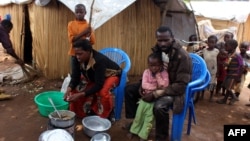The U.N. refugee agency says nearly 6,000 Congolese refugees have been helped to return home since December 2021, after years of exile in Zambia.
The voluntary repatriation of Congolese refugees was based on a tripartite agreement signed in 2006 by the UNHCR and the governments of Zambia and the Democratic Republic of Congo.
The refugees had fled political and inter-ethnic clashes in the DRC’s southeast region in 2017. They have gone back to their communities of origin in Haut-Katanga. Many parts of the DRC are riven with conflict and remain highly insecure.
However, UNHCR spokesman Boris Cheshirkov said Haut-Katanga is stable, making the returns possible. He said some 600 people are transported from Zambia on buses in weekly convoys to the DRC’s Lukinda border post. He said more than 11,000 Congolese refugees are expected to have gone back to the DRC by the end of the year.
“Refugees have been issued with voluntary repatriation documents and have received expedited immigration clearance, health screening, security, food, and water prior to their journey,” he said. Children account for 60% of those refugees that are now returning.”
Cheshirkov said children born in Zambia have been issued birth certificates as proof of their identity. He said the Ministry of Education has issued transfer documents to schoolchildren so they can continue their education in the DRC.
He noted the refugees have expressed excitement and joy at returning home, and that they look forward to reuniting with family and friends and starting their lives anew. He said the UNHCR is providing returnees with cash assistance to help them cover basic expenses upon arrival.
“It also helps them with transportation costs to meet their ultimate destination,” Cheshirkov said. “They are able to purchase hygiene items, household items and then to pay their own first rent, which gives them a step in the right direction. Then, based on family size, they also are provided with a package that includes pulses (soybeans) and maize meal, oil, and salt, and other basics that will help them to move in.”
Cheshirkov said the UNHCR continues to work with local and traditional authorities.
He said the agency also conducts monitoring missions to the locations to make sure the returns are sustainable.
Zambia currently hosts more than 95,600 refugees, asylum seekers and former refugees. They include just over 60,000 from the DRC.




